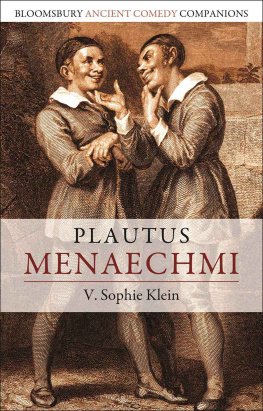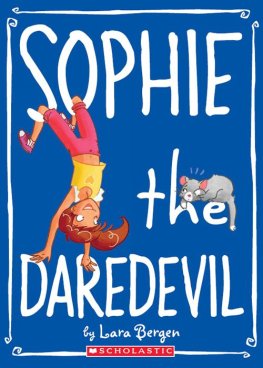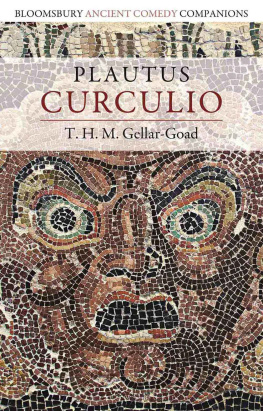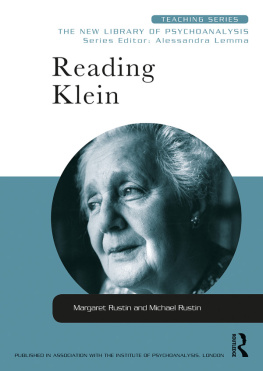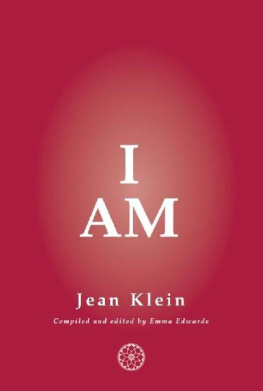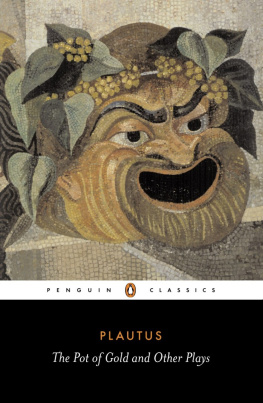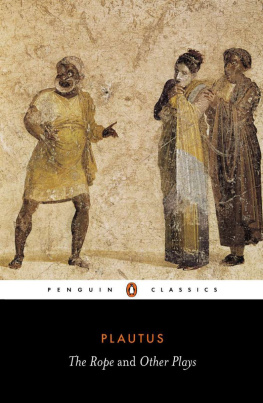V. Sophie Klein - Plautus: Menaechmi
Here you can read online V. Sophie Klein - Plautus: Menaechmi full text of the book (entire story) in english for free. Download pdf and epub, get meaning, cover and reviews about this ebook. year: 2021, publisher: Bloomsbury, genre: Home and family. Description of the work, (preface) as well as reviews are available. Best literature library LitArk.com created for fans of good reading and offers a wide selection of genres:
Romance novel
Science fiction
Adventure
Detective
Science
History
Home and family
Prose
Art
Politics
Computer
Non-fiction
Religion
Business
Children
Humor
Choose a favorite category and find really read worthwhile books. Enjoy immersion in the world of imagination, feel the emotions of the characters or learn something new for yourself, make an fascinating discovery.
- Book:Plautus: Menaechmi
- Author:
- Publisher:Bloomsbury
- Genre:
- Year:2021
- Rating:5 / 5
- Favourites:Add to favourites
- Your mark:
- 100
- 1
- 2
- 3
- 4
- 5
Plautus: Menaechmi: summary, description and annotation
We offer to read an annotation, description, summary or preface (depends on what the author of the book "Plautus: Menaechmi" wrote himself). If you haven't found the necessary information about the book — write in the comments, we will try to find it.
Plautus: Menaechmi — read online for free the complete book (whole text) full work
Below is the text of the book, divided by pages. System saving the place of the last page read, allows you to conveniently read the book "Plautus: Menaechmi" online for free, without having to search again every time where you left off. Put a bookmark, and you can go to the page where you finished reading at any time.
Font size:
Interval:
Bookmark:

To my family,
my favorite cast of characters and
most cherished source of laughter.
BLOOMSBURY ANCIENT COMEDY COMPANIONS
Series editors: C. W. Marshall & Niall W. Slater
The Bloomsbury Ancient Comedy Companions present accessible introductions to the surviving comedies from Greece and Rome. Each volume provides an overview of the plays themes and situates it in its historical and literary contexts, recognizing that each play was intended in the first instance for performance. Volumes will be helpful for students and scholars, providing an overview of previous scholarship and offering new interpretations of ancient comedy.
Aristophanes: Frogs, C. W. Marshall
Aristophanes: Peace, Ian C. Storey
Menander: Epitrepontes, Alan H. Sommerstein
Menander: Samia, Matthew Wright
Plautus: Casina, David Christenson
Plautus: Curculio, T. H. M. Gellar-Goad
Terence: Andria, Sander M. Goldberg

I am writing this from a rocking chair in my sisters guest-room, which has become my personal writers retreat every weekend for almost a year now. Beside me, theres an open window letting in a cool spring breeze, a bouquet of tulips, hyacinths, and pussy willows thoughtfully chosen and beautifully arranged by my mum, and a cup of ginger tea made by my brother-in-law at the end of his long workday. My husband has put the kids to bed. Its late now, so the house is unusually quiet. Most of the time its filled with the irrepressible shouts, laughter, and rumpus of my beloved daughters and nephews, the youngest of which happen to be identical twins. My family takes turns watching them, cooking, and cleaning so that I can write. I spend my breaks playing Pokmon Superhero Space Adventure (i.e. running around and climbing on stuff) in the garden. This is what I hope to remember most from 20202021.
First and foremost, I want to thank my family, especially Jon, Arielle, and Emily, for their love and support during this extraordinary time. This book was possible because of you, and it is for you. Next, Id like to thank my wonderful editors, Toph Marshall and Niall Slater, and Lily Mac Mahon, Alice Wright, Paul King, Merv Honeywood, and the whole team at Bloomsbury, for enriching this book with their expertise, guidance, and encouragement. Id also like to thank the Boston University Center for the Humanities for generously supporting this project with a Publication Production Award. Special thanks too to Griffin Budde for his incisive and insightful editorial work on the manuscript, as well as to Kyna Hamill, Brian Walsh, Irit Kleiman, Zsuzsa Varheyli, and Sarah Frederick for their invaluable feedback on drafts and their inspiring collegiality. Boundless gratitude to Helen Romero, Holly Benson, Ana Cuna, Megan Byrne, Ismerai Izzy Reyes, Merari Mimi Reyes, Nena Marcelino, Karen Tosh, and Tracey Maclin for brightening our lives each in their own helpful ways. And, finally, my most heartfelt thanks to all of my students over the years and, in particular, my Spring 2021 Roman Comedy class, who successfully proved that Menaechmi can still make people laugh, even via a Zoom production during a global pandemic.
Plautus Menaechmi is a rollicking comedy of errors about a pair of long-lost identical twin brothers who reunite after many years and one madcap day of mistaken identity mix-ups. With its fanciful premise, memorable characters and farcical antics, the play is one of the most accessible, influential and enduring examples of Roman Comedy. Its not all bubbly doubling and happy endings, however. While Menaechmi showcases a playful plot, sparkling dialogue and dynamic stage action, its humour can also be dark and deeply troubling at times, particularly in its depictions of slavery and misogyny. The playwright balances shtick and social commentary, bumbling tomfoolery and soaring word play to tell a tale that is distinctly Plautine and also part of a much larger comic tradition.
The aim of this book is to provide the essential background information for studying and interpreting the play. It situates Menaechmi in its original cultural, theatrical and thematic contexts, and shines a spotlight on the witty language, waggish personalities and wacky shenanigans that shape the story and epitomize Roman Comedy. Chapter 1 sets out an overview of the play, its playwright, and the circumstances of its composition and production (when, where, how, by whom, and for whom Menaechmi was originally performed). Chapter 2 investigates Menaechmis setting, characters and themes. The first section discusses the relationship between the Greek world in which the comedy is set and the Roman world for which it was written. The subsequent sections each focus on a particular stock character, providing the relevant socio-historical background, discussing the characters representations in this play and in the New Comic tradition, and exploring the themes that arise from their interactions with one another. Chapter 3 looks at the bits, banter, and buffoonery that typify Plautine humour and electrify the script, including metatheatre, word play and physical comedy. It also unpacks the preposterously drawn-out recognition scene. Finally, Chapter 4 presents an overview of Menaechmis reception, beginning with its first known revival (c. 1486) under Ercole I, the Duke of Ferrara, and ending with a survey of notable modern productions. In all, the book explores the timelessness and universality of the play, which is at once a descendant of Greek New Comedy, an emblem of Roman Comedy, and a forebear of English, French, Italian, and broader global drama.
The story takes place in Epidamnus, a Greek city infamous for its hussies and hustlers (258264). The scene is set on a street in front of two houses: that of Menaechmus and that of his prostitute, Erotium. A prologue, delivered by an unnamed speaker, lays out the back-story (176): Once upon a time there was a merchant from Syracuse who had a pair of twin sons named Menaechmus and Sosicles. Leaving Sosicles at home, the merchant took young Menaechmus on a business trip to Tarentum. There, the child was kidnapped by a merchant from Epidamnus who adopted him as his own. Devastated by the loss of his son, the poor father died of grief. Back in Syracuse, the twins grandfather heard the news and decided to rename the remaining son Menaechmus after his abducted brother and, moreover, himself. To avoid any confusion on the audiences part, the prologue emphatically underscores that both twins will be called Menaechmus. Got it? (4748). Bringing us to the present, he reports that Menaechmus of Epidamnus (E) has grown up, married, and inherited his adopted fathers fortune. Menaechmus of Syracuse (S) (originally named Sosicles), meanwhile, has spent many long years searching for his brother and unwittingly arrives this day on his shores.
Following the prologue, we meet Peniculus, the parasite (77109). A free man, but a slave to his appetite, he sponges food off of others in exchange for flattery. Peniculus has come to call on Menaechmus E, who storms out of his house berating his wife (matrona) still offstage for her incessant nagging and spying (110122). With a wink to the audience, Menaechmus E proudly confirms her suspicions: he announces that he is off to dine with his prostitute (123126) and reveals that he has stolen a cloak (
Next pageFont size:
Interval:
Bookmark:
Similar books «Plautus: Menaechmi»
Look at similar books to Plautus: Menaechmi. We have selected literature similar in name and meaning in the hope of providing readers with more options to find new, interesting, not yet read works.
Discussion, reviews of the book Plautus: Menaechmi and just readers' own opinions. Leave your comments, write what you think about the work, its meaning or the main characters. Specify what exactly you liked and what you didn't like, and why you think so.

